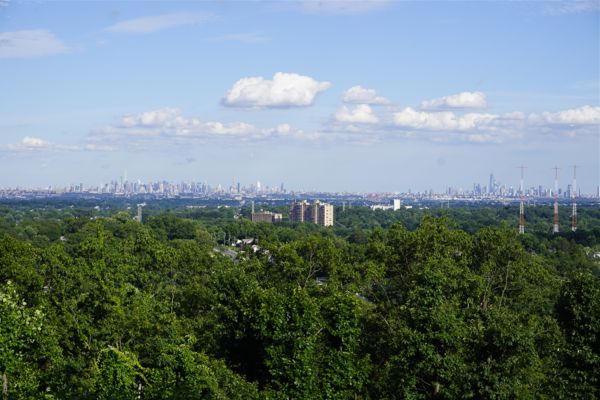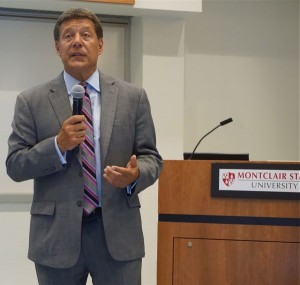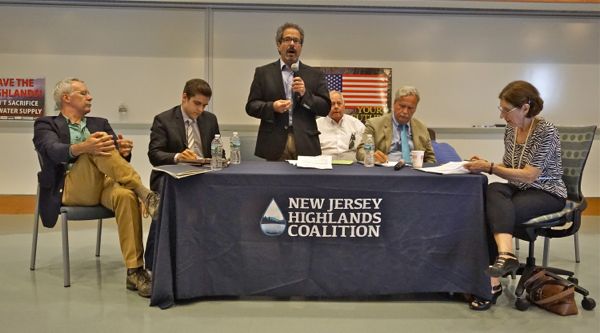Jersey City Mayor Fulop joins the battle to protect drinking water
Assemblyman McKeon, Highlands Champion, Moderates Meeting
[Update: Dave Giambusso at Politico writes about the Fulop angle and legislative vetoes:
Fulop wades into Highlands fight with online campaign –
Environmental advocate Bill Wolfe applauded Fulop and said Sweeney should also join the fight.
“We’re pleased that Mayor Fulop understands how the Highlands provide clean water for urban New Jersey,” Wolfe said. “We call on Senate President Sweeney to get with the program and post SCR 66 for Senate passage and to support a resolution to veto the DEP Highlands rule rollbacks.”
SCR 66 is the legislative veto of a Flood Hazard Control rule change that will potentially allow more development in the buffer zones of high-quality streams. The Legislature has voted three times — twice in the Assembly and once in the Senate — to overturn the rule. One vote remains in the Senate and appears to have enough support to pass but Sweeney has not posted it for a vote. ~~~ end update]
Although few in number, about 30 NJ Highlands advocates were joined by political heavyweights last night at a special public meeting to build public awareness and opposition to the Christie DEP proposal to weaken a critical Highlands clean water protection known as the Septic Density Standard.
Jersey City Mayor Fulop sent the Deputy Mayor, who spoke knowledgeably about the value of the Highlands and threats overdevelopment poses to water resources. Speaking for Fulop, he strongly opposed the Christie DEP rollback as a threat to Jersey City’s water supply, noting Governor Christie’s abuse of power and violation of legislative intent. Hitting the Constitutional Legislative Veto nail on the head, he said the proposal:
would gut core protections of the Highlands Act through administrative means.
Fulop also is circulating an on-line citizen’s petition – See “Protect New Jersey’s Drinking Water” – exercising the same leadership he did in the recent victory to block Governor Christie’s DEP plans to commercialize, privatize, and develop Liberty State Park. Bravo!
Fulop’s leadership shines a bright light on Senate President Sweeney – his likely opponent in the ongoing Democratic competition for Governor. Sweeney has stalled the Senate Resolution (SCR 66) to veto another major DEP clean water rollback and not yet taken a position on the Christie DEP’s Highlands rollback.
The Star Ledger recently editorialized, urging Sweeney to pass the Resolution, see:
I suggested last night that, given Fulop’s leadership, Sweeney doesn’t want to be viewed as the dirty water candidate for Democratic nomination for Governor in a race with Fulop, so, folks need to let Sweeney know that he should get on board and fight for clean water!
Sweeney joined Fulop in the battle for Liberty State Park – he needs to do the same again.
The meeting was moderated by Assemblyman John McKeon, a prime sponsor of the Highlands Act and champion for Highlands protections.
McKeon expressed a clear understanding of the flaws in the DEP proposal and why it conflicted with legislative intent.
He has introduced an Assembly Resolution to veto the proposal (see ACR 192).
Last night, in response to my question about the Senate side, he said a companion would soon be introduced by Senator Smith, another co-sponsor of the Act and Highlands champion.
I’ve written extensively about the proposal, so will stop here (e.g. see this and this and this and this and especially THIS and THIS.)
I applaud the Highlands Coalition and the other groups who organized the event – it was exactly the kind of reasoned public dialogue, activism and organizing we need to build public awareness and opposition to a complex and quickly moving rule proposal.
Highlands defenders need to get the word out and lobby legislators to support the McKeon & Smith Resolutions to veto the rule.
The Christie DEP is hell bent on adopting it as a mechanism to compensate property owners for lost development potential under the Act and to promote economic development.
They must not be allowed to weaken clean water protections to accomplish those goals.
At this point, the only way to do so is for the Legislature to defend the Act and block the Governor’s abuse of executive power.
[End Note: The DEP response to criticism in the Politico story is more spin:
“This is what happens when legislators or mayors just run with what is to fed to them by certain groups to appease those groups, without actually checking the facts on their own,” DEP spokesman Bob Considine said. “For starters, the ‘400 percent’ in development density is nothing more than a myth.”
I have not used that “400 percent increase in development density” phrase, but it is partially true and certainly not a “myth”.
The current septic density standard in forested areas of the Highlands Preservation Area is 88 acres. The DEP proposed new standard is 22 acres. That’s the source of the “400 percent” claim made by some. The claim leaves out the reduction of the current agricultural density of 25 acres to 12 and 13 acres. While the large majority of the land in the Preservation zones is forested, it is not completely accurate to claim 400 percent – that’s why I have not used the claim.
Regardless, the DEP press office needs to do the math – fractions and percentages are learned in 3rd or 4th grade. 88 divided by 22 = 4. In common usage, a fourfold increase in development density is 400 percent. Mathematically, it is actually a threefold increase, or 300%. Still, DEP’s criticism as “myth” is more misleading than the claim. ~~~ end]
[Update#2 – 7/13/16 – good Bergen Record story:
[Update #3 – 7/18/16 – Star Ledger runs a killer editorial:
So, enough. Not only should Sweeney stand up to the governor on stream and river protections, the Legislature should pass a similar resolution that overturns the rule changes on sewers and septic tanks, too. Christie officials shouldn’t get to conduct their policy negotiations behind closed doors. Time for a Legislative veto.




Pingback: WolfeNotes.com » Christie DEP Denies Public Records Request For Emails On Highlands Act Science and Legislative History